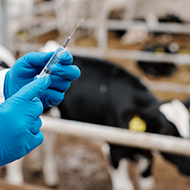
73 per cent of respondents believe that medicines positively impact farm animal welfare.
A new survey conducted across the UK and seven other European countries has found a general good awareness of the benefits of veterinary medicines for the health and welfare of pets and farm animals.
The survey was commissioned by NOAH’s European animal health association AnimalhealthEurope. It showed that 73 per cent of those asked believe that veterinary medicines have a positive impact on the welfare of farm animals.
Most respondents also agreed on the importance of vaccinating farm animals, with 79 per cent of those asked in the UK stating that farm animals should be vaccinated regularly. In addition, 87 per cent of respondents agreed that prevention is better than cure for farm animal disease.
In regards to pets, 81 per cent of respondents agreed that pets should be vaccinated regularly. 83 per cent felt that pets should be checked by a vet at least once a year and 88 per cent recognised the importance of using tick and flea prevention regularly.
The survey did reveal that, in some areas, people were generally unaware of the rules and regulations on the use of veterinary medicines. For example, 61 per cent of respondents were unaware that antibiotics have been banned for growth promotion purposes in farm animals since 2006.
NOAH chief executive Dawn Howard said: “We are delighted to see great support for our UK farmers and vets in this survey, with 83 per cent agreeing farmers care for the health and welfare of their animals.
“Where misunderstandings and concerns do exist, such as around the use of antibiotics to treat farm animals, we will continue to help address these and help explain the strict regulations that govern the authorisation of all animal medicines and the work we all do to support their responsible use.”



 Julian Hoad has been confirmed as the new president of the British Small Animal Veterinary Association (BSAVA), taking over from Carl Gorman.
Julian Hoad has been confirmed as the new president of the British Small Animal Veterinary Association (BSAVA), taking over from Carl Gorman.